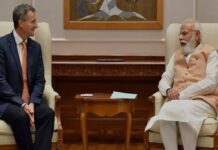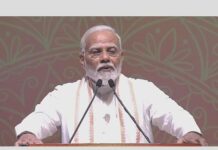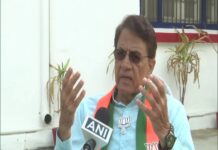
NEW DELHI: Myanmar’s democracy icon Aung San Suu Kyi in a first in recent times from a public forum expressed disappointment over how India drew close to the military junta after initially supporting the democracy movement there.
Even as she suggested that she was no longer impacted by expectations and disappointment, the Nobel laureate said she had been “saddened” by the fact that India had drawn away in her country’s “most difficult days”.
Suu Kyi made the remark while delivering the prestigious Jawaharlal Nehru memorial lecture here. Myanmar’s main opposition leader added that she had not lost faith in India because she believed that relations between the two countries were based on friendship between the people. “I was saddened by the fact that India had drawn away in our most difficult days but always had faith in our lasting relationship,” she said. Friendship should be based between people and not governments; governments come and go.”
Her remarks came at the end of the lecture during which she recalled her struggle for democracy even while under house arrest for 21 years and her father General Aung San’s friendship with Nehru. Suu Kyi reached out to the people of India, saying, “We hope that in the last phase of our struggle, people of India will stand by us and walk by us on the path that they were able to proceed on many years ago.”
Asked about her expectations from India as well as her disappointments on her visit to the country. “I have thought about it carefully and realized that expectations and disappointment are not something we can indulge in,” she said, before adding that she had indeed been saddened by India’s conduct.
As she invited her to deliver the Jawaharlal Nehru Memorial lecture, Sonia Gandhi described her as “one of the most remarkable figures of our time” saying she had imbibed the best of the East and the West.
“She exemplifies all qualities he (Nehru) most admired: fearlessness, integrity, moral and intellectual courage, perseverance, freedom from anger and bitterness and unqualified devotion to betterment of the life of her people through the path of dialogue and national reconciliation,” Sonia said.
She said Indian people revere Suu Kyi for the sacrifices she has made. Sonia recalled how on receiving the news of the assassination of Suu Kyi’s father, Nehru had written to her mother saying he had lost a friend who was looked at with hope by Burma and Asia. “You are the worthy inheritor of a noble father’s legacy,” she said.
Her inspiration
During her meeting with Prime Minister Manmohan Singh, Suu Kyi discussed a variety of issues, including the national reconciliation process under way in her country and the process of democratization in this context.
At the half-hour meeting, Dr. Singh expressed his happiness in receiving Ms. Suu Kyi and appreciated the progress made by her and President Thien Sien.
Dr. Singh praised Ms. Suu Kyi for her “indomitable” courage and unwavering resolve for democracy in Myanmar. “Our good wishes are with you as indeed with your struggle for democracy. We admire you for the indomitable courage you have shown,” he told her.
At the meeting, which was held without the presence of aides, the leaders agreed for need to have greater cooperation between the parliaments and judiciaries of the two countries.
Giving details of the meeting, senior government officials said the Prime Minister and Ms. Suu Kyi also agreed that people-to-people relations were important.
Later in the day, delivering the Nehru Memorial Lecture on the 123rd birth anniversary of the former Prime Minister, Suu Kyi spoke about the influence of Indian leaders, including Mahatma Gandhi and Jawaharlal Nehru, the principles that guided India’s freedom struggle and how they inspired her as she continues to strive for a democratic Myanmar.
“These past few months have given me many opportunities to thank people, governments, and organizations for support to the democracy cause in Burma. Today I wish to thank you for the Jawaharlal Nehru memorial prize that was given to me in 1995 when I was released from the first term of my house arrest,” she began.
Dressed in a yellow and purple traditional Burmese dress with yellow flowers arranged in her hair, Ms. Suu Kyi said the thoughts and actions of leaders of the Indian independence movement inspired the movement in Burma and that their pro-democracy movement was firmly based on non-violence.
Reflecting on her memories of Jawaharlal Nehru, she said she remembered him more as a father figure to her parents and little as a statesman. “To my infant mind he was the kindly old man who provided my father two sets of uniforms, the smartest that he had,” she said, narrating the story of how her father Aung San had stayed with Nehru as his personal guest while on his way to London to negotiate Burmese independence.
Throughout her speech, Ms. Suu Kyi linked Nehru’s experiences to her own and reflected on the part of their lives that were spent as political prisoners.






